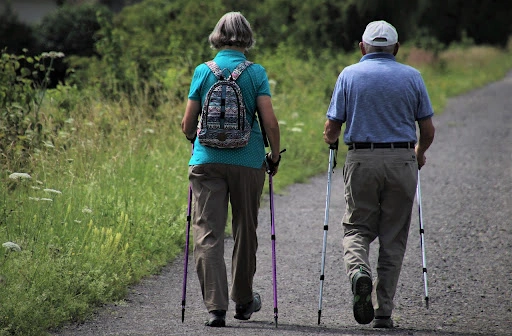Promoting Senior Health through Walking and Outdoor Activities

As we age, it becomes increasingly important to prioritize our health and well-being. Engaging in regular physical activity is one of the best ways to maintain good health, and walking and outdoor activities are excellent options for seniors.
Not only are they accessible and low-impact, but they also offer a range of physical, mental, and social benefits. In this blog post, we will explore how walking and outdoor activities can promote senior health and provide tips on incorporating them into daily routines.
Physical Benefits
Walking is a simple yet powerful form of exercise that can greatly benefit seniors. It is a low-impact activity that puts minimal stress on joints, making it suitable for individuals of all fitness levels.
Regular walking helps improve cardiovascular health, strengthen bones and muscles, and maintain a healthy weight. Additionally, it can help reduce the risk of chronic conditions such as heart disease, diabetes, and arthritis.
Outdoor activities, such as hiking, gardening, and swimming, offer unique physical benefits as well. Hiking on uneven terrain helps improve balance and stability, while gardening involves a variety of movements that promote flexibility and strength.
Swimming, on the other hand, is a gentle activity that provides a full-body workout without putting excessive strain on joints.
Mental Well-being
Engaging in outdoor activities has been linked to improved mental well-being in seniors. Spending time in nature can reduce stress, anxiety, and symptoms of depression. The sights, sounds, and smells of the outdoors can have a calming effect on the mind and help alleviate mental fatigue.
Walking or exercising outdoors also exposes seniors to natural sunlight, which boosts vitamin D levels and improves mood.
Moreover, being in nature encourages mindfulness and a sense of connectedness. It offers a chance to switch off from the digital world and concentrate on the here and now. Seniors can experience the beauty of their surroundings while taking a walk in a park or forest, for instance, could enhance their general wellbeing.
Social Engagement
One of the greatest benefits of walking and outdoor activities for seniors is the opportunity for social engagement. Walking in groups or participating in outdoor group activities provides a chance to connect with others who share similar interests. This social interaction can combat feelings of loneliness and isolation, which are common among seniors.
Joining walking clubs, senior sports leagues, or community gardening groups are excellent ways to meet new people and foster friendships. These social ties give people a sense of community and support, which promotes general happiness and mental health.
Seniors who engage in regular physical activity are more likely to maintain a healthy life and style hub, embracing an active and fulfilling retirement.
Tips for Incorporating Walking and Outdoor Activities
Now that we understand the numerous benefits of walking and outdoor activities for seniors let’s explore some tips on how to incorporate them into daily routines:
Start slow and gradually increase the intensity
It’s crucial to start any new physical activity at a comfortable level before escalating the difficulty over time. If you’re new to walking or outdoor activities, it’s recommended to start with shorter distances or easier trails.
This allows your body to adapt and build stamina gradually. Starting slowly also reduces the risk of injury and helps you gain confidence in your abilities. As you become more comfortable, gradually increase the duration and intensity of your walks or activities.
This could involve walking for longer distances, tackling more challenging terrains, or adding some light resistance exercises to your routine. By gradually increasing the intensity, you’ll continue to challenge your body and see improvements in your overall fitness level.
Find a walking buddy or join a group
Walking with a partner or joining a walking group can significantly enhance your experience and motivation. Having someone to walk with not only makes the activity more enjoyable but also holds you accountable and encourages you to stay consistent.
Look for local community organizations, senior centers, or fitness groups that offer walking groups specifically tailored for seniors. This way, you can maintain good health while socializing, making friends, and interacting with like-minded people.
When you walk with others, you may exchange updates on your progress, difficulties, and victories, which can be a tremendous source of inspiration and support.
Explore nearby parks and nature trails
Research and explore the local parks, wildlife preserves, and walking paths in your area rather than sticking to the same walking route or neighborhood. Discovering new environments and scenery adds variety to your outdoor activities and keeps them exciting and engaging.
Particularly peaceful and serene environments like those found on nature trails might improve your general well-being. Look for trails with different levels of difficulty to suit your fitness level and preferences. You may enjoy the wonders of nature while gaining the health advantages of being outside by exploring various parks and paths.
Dress appropriately and stay hydrated
It is important to dress appropriately with your physical comfort in mind. Wear comfortable clothing that allows freedom of movement and is suitable for weather conditions.
Choose breathable fabrics that wick away moisture and protect you from excessive heat or cold. Layering your clothing is also beneficial, as it allows you to adjust to changing temperatures throughout your walk or activity. Don’t forget to wear supportive footwear that provides cushioning and stability, reducing the risk of foot and joint pain.
Additionally, keep yourself hydrated while on your outdoor outings by always having a water bottle with you. Proper hydration is vital for maintaining energy levels and preventing dehydration, especially during warmer weather or longer walks.
Set realistic goals and track your progress
Setting achievable goals is crucial to stay motivated and track your progress. Decide what you want to achieve with your walking or outdoor activities, such as logging a certain amount of daily steps, gradually extending your distance, or finishing a certain path.
Set targets that are realistic and attainable based on your current fitness level.It’s beneficial to divide your goals into more manageable milestones so you can recognize and reward yourself for your progress.
A pedometer, fitness tracker, or smartphone app can help you track your progress and accomplishments.
This helps you stay accountable and provides a sense of satisfaction as you witness your improvements over time.
Be mindful of safety
Outdoor activities should always be done with safety as the main priority. Here are a few significant safety tips:
Carry a cellphone
Keep your phone charged so you can contact someone in a case of emergency or call for assistance.
Inform someone about your plans
Before you take part in any outside activity, let a family member, friend, or neighbor know where are you going. Inform them of your destination and expected time of absence.
Be aware of your surroundings
Watch out for potential dangers and be aware of your surroundings. Look out for uneven surfaces, low branches, or slippery areas that may pose a risk. Stay on designated paths and trails, and avoid areas with limited visibility or unfamiliar terrain.
Use sun protection
Before heading outside, use sunscreen with a suitable SPF to protect yourself from the sun’s damaging rays. A wide-brimmed hat, sunglasses, and light, breathable clothing can help protect your skin from excessive sun exposure.
Seek guidance from a healthcare professional
If you have any underlying medical conditions, it is recommended that you speak with your doctor or a healthcare physician before starting any new fitness plan. They can guarantee your safety, recommend suitable activities, and provide personalized guidance.
Wrapping Up
Seniors can greatly benefit from walking and other outdoor activities to improve their health and wellbeing. They offer a holistic approach to senior care with their many physical, mental, and social advantages.
By incorporating walking and outdoor activities into daily routines, seniors can maintain an active and fulfilling lifestyle while enjoying the beauty of nature and the company of others. So, put on your walking shoes, step outside, and embrace the many joys of staying active in the great outdoors!




